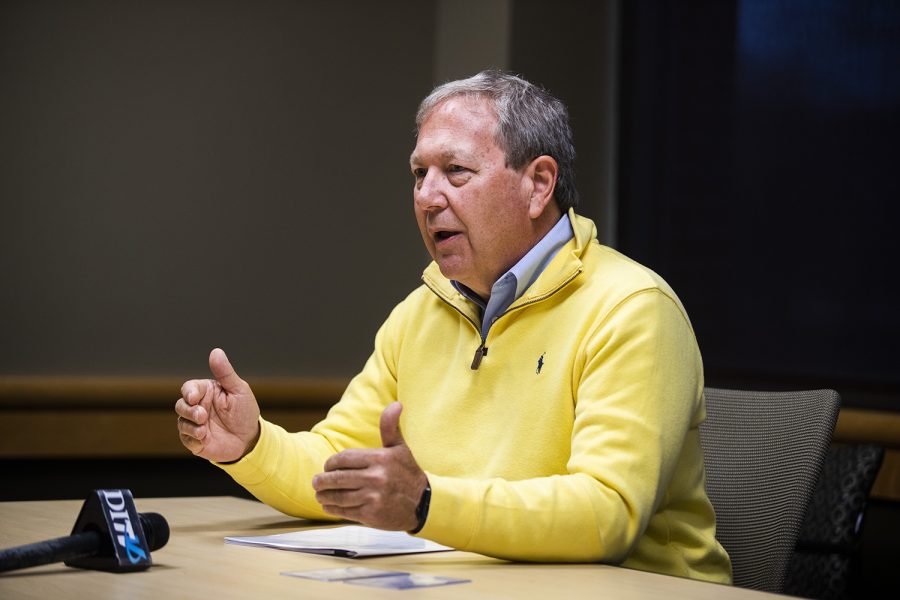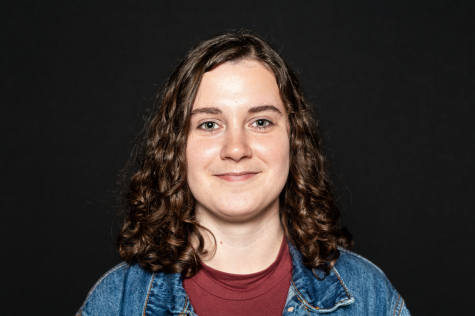UI utility system P3’s $999 million in net proceeds remain in ‘short-term instruments’ as COVID-19 wreaks havoc on economy
UI President Bruce Harreld told the DI the funds from the 50-year public/private partnership to maintain and operate campus utilities remain in short-term instruments.
UI President Bruce Harreld answers questions during an interview with The Daily Iowan in the Adler Journalism Building on Monday, Dec. 9, 2019.
May 18, 2020
The University of Iowa is keeping approximately $999 million in proceeds from its utility system public/private partnership in short-term instruments while the stock markets tumble and uncertainty looms over the nation’s economic outlook because of COVID-19.
The $1.165 billion 50-year deal with a private entity to maintain and operate UI utilities reached financial close March 10, just days before the Dow Jones industrial average fell almost 2,353 points, closing at 21,200.62. Days later, on March 16, the market saw its new largest one-day point loss in history, falling over 2,997 points to close at 20,188.52 points.
After paying utility system bond debt and consultant fees, which amounted to $166 million, the UI is using the net proceeds to invest in a new endowment and allocate to campus through grants in support of the strategic plan.
“The market’s down substantially since then,” UI President Bruce Harreld told The Daily Iowan in a May 6 interview. “When you have that degree of money, you don’t put it immediately into any investments — you put in short-term instruments. The reason you put it in short term is just because they tend to hold up pretty well. So you don’t put it into an investment of stocks or other types of activities, and so we’re pretty liquid.”
UI media-relations Director Anne Bassett said in an email that 30 percent of the net proceeds are in fixed income accounts, and the other 70 percent of the net proceeds are invested primarily in money market accounts, which she said are not subject to the volatility of the investment markets.
“Over the next year, the Strategic Initiatives Fund is using a thoughtful and measured approach by allocating capital slowly and systematically from the money market fund into a diverse basket of asset classes,” Bassett said.
Currently, the UI plans to invest around $15 million annually beginning fiscal 2022, the budget year beginning July 1, 2021, from the partnership proceeds. Bassett said this plan for allocating the funds “will be adjusted as needed based on market conditions.”
Harreld said the short-term instruments don’t generate as much money as the UI anticipated, though university officials already modeled conservative rates of return in drafting the deal.
“Most of the portfolios of endowments across the United States have actually taken a 10 percent haircut. We haven’t had that,” he said. “So we’re fortunate to have a lot of cash. You could argue that if we’re smart investors, we should be able to buy it at a low and make some positive returns over the next year.”
In an interview with CBS published Sunday, Federal Reserve Chairman Jerome Powell said economic recovery may stretch through the end of 2021.
The federal government and the board of the nation’s central banking system have already taken historic action to address the havoc the COVID-19 pandemic has wreaked on the U.S. economy.
The Fed cut interest rates to near zero and offered more than $3 trillion in lending to banks, businesses, cities, and states in partnership with the treasury, giving a needed boost to the credit markets. Congress has already passed bipartisan relief packages costing around $3 trillion to ease some of the economic fallout from the novel coronavirus, while House Democrats and congressional Republicans and Trump administration officials spar over how much more action is needed to fund programs intended to spur economic activity.
Though it’s unclear when the economy will return to normal, Harreld said, the UI’s in a good position with this fund.
“You could argue that we’ve got a real opportunity here to even create more wealth for ourselves, but that’s all speculative at this stage,” he said.
The UI faces $76 million in expenses and lost revenue through August from responding to the coronavirus, Harreld has told the sate Board of Regents, but Bassett said funds from the public/private partnership will not be used to supplement any lost funding.
“The university has been clear that these resources are to be used to invest in the future success of the university,” she said. “Utilizing these funds to backfill a budget hole would rob future generations of the benefit of these resources, so the UI must and will practice discipline in allocating these resources.”















